OKLAHOMA CITY – The third annual Oklahoma Muslim Day at the Capitol was held Thursday. Below are updates from Red Dirt Report’s freelancers covering the events of the day.
From Tim Farley:
In one of the morning sessions, panelists focused on ways to strengthen hate crime laws in Oklahoma and on the federal level.
Brady Henderson, legal director for the American Civil Liberties Union of Oklahoma, said revisions to the existing laws should enhance punishment.
“It might be a misdemeanor on the face of it, but the circumstances surrounding it would enhance the crime and punishment,” he said.
At the same time, hate crimes and their associated biases tend to be more violent and disruptive than typical crimes committed across the nation, said University of Oklahoma law professor Joseph Thai. At the same time, Thai said courts must punish a person’s conduct and not the speech, which is protected by the First Amendment.
“That’s the problem with targeting the speech,” he said.
In some instances, protests by anti-Muslim groups are filled with vulgar and spiteful comments. But that type of speech is protected, Thai said.
Mana Tahaie, of the Tulsa YWCA, noted gender is not protected under Oklahoma’s hate crime statutes.
“Some states have more expansive laws,” she said. “Oklahoma’s could be strengthened.”
Panelists also acknowledged that committing a crime against someone “who is different” is not necessarily a hate crime.
“You must show intent,” Tahaie said.
Two out of every three hate crimes are not reported, she said, referencing information from multiple sources. In addition, Tahaie claims police officers often dissuade victims from reporting hate crimes, which can skew the actual number in any given year. Oklahoma law enforcement officials reported 32 hate crimes in 2015, the last year figures are available, according to statistics compiled by the Oklahoma State Bureau of Investigation.
“And only one was a Muslim-reported crime,” she told the audience. “Under-reporting like that can hurt advocacy for marginalized communities.”
Panelist Sarah Adams-Cornell, an activist who promotes Native American rights, said minorities who face the potential of hate crimes, should learn how and where to report those types of crimes.
“When a community is not informed, it is hard to know what is a hate crime,” she said. “They’re wondering ‘Is this a hate crime or is it a personal attack on me?’”
For most people, there was no doubt Tulsa man Khalid Jabara was the victim of hate crime. Jabara was gunned down on his front porch in August 2016 by neighbor Stanley Vernon Majors, who would yell “dirty Arabs” and “filthy Lebanese” at members of the Jabara family. In addition, Majors would hurl racial epithets at people who came to work on the family’s lawn.
Majors has been charged with first-degree murder in Tulsa County.
Henderson said many hate crimes, including Jabara’s death, are preventable.
“It’s not about the [hate crime] law. It’s about the people enforcing the law,” the ACLU attorney said. “Khalid Jabara’s death was preventable. There’s no excuse.”
Prosecutors allege Majors harassed the Lebanese, Orthodox Christian family since they moved into the neighborhood. Police were called to the house multiple times.
Henderson claims most law enforcement officials are “very white” and believe in the Christian religion only.
“It’s rare to see an African-American or Native American police officer or assistant district attorney,” he said to the predominantly Muslim audience. “Go become a police officer and change the outcomes.”
Nick Oxford was at the Capitol for the second half of the day’s events:
Jim Gilles, left, protests Oklahoma Muslim Day at the Oklahoma State Capitol.
Supporters welcome members of the Muslim community to the Oklahoma State Capitol.
Supporters stand in front of protestors to welcome members of the Muslim community to the Oklahoma State Capitol.
Imam Imad Enchassi speaks to members of the Muslim community at the Oklahoma State Capitol.
Imam Imad Enchassi, left, leads members of the Muslim community in prayer at the Oklahoma State Capitol.
Sam Sales, right, and other members of the Muslim community pray at the Oklahoma State Capitol.
Members of the Muslim community listen to Rep. Scott Inman (D-Oklahoma City) at the Oklahoma State Capitol.
Protester Scott Gilles, left, argues with members of the Muslim community.
Edgar O’Neal was at St. Luke’s United Methodist Church for the first half of the day’s events:
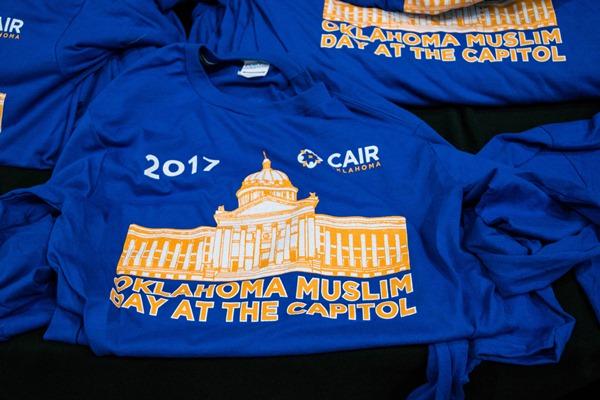
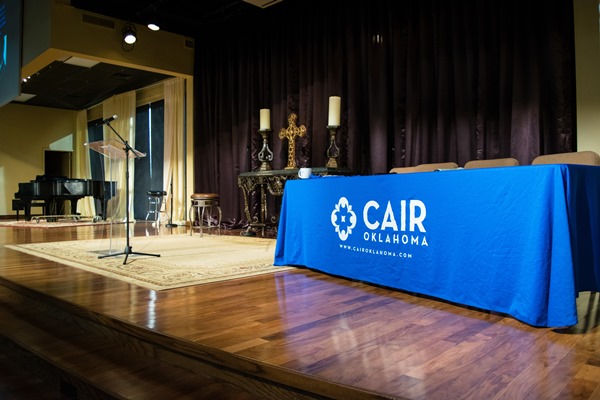
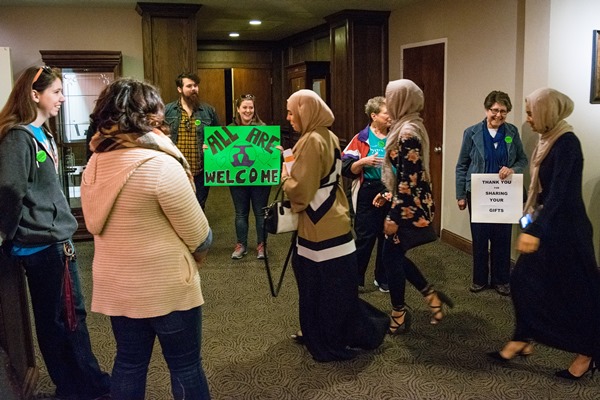
Welcoming guests to the event.
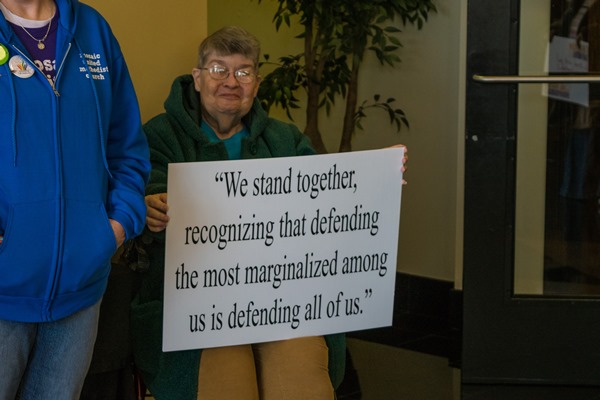
Members of St. Luke’s UMC greet guests.
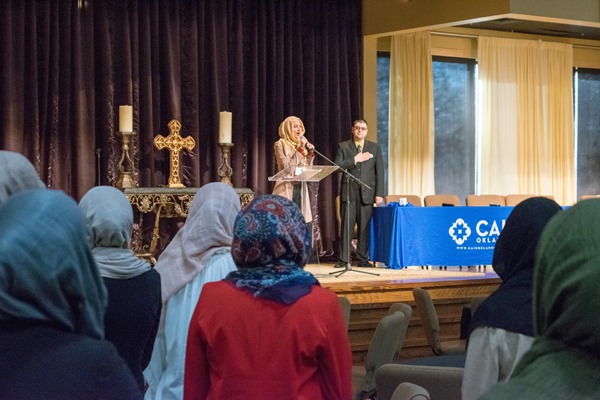
The National Anthem being sung Thursday morning at St. Luke’s United Methodist Church.
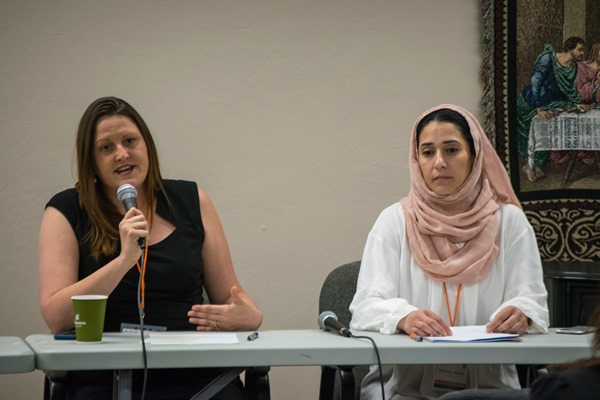
Amanda Ewing and Buthaina Jawayyed speaking about “Deepening Crisis of Public Education.”
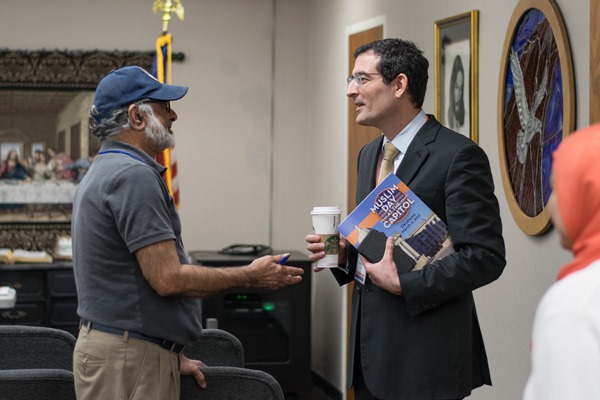
Councilman Ed Shadid before his breakout session.
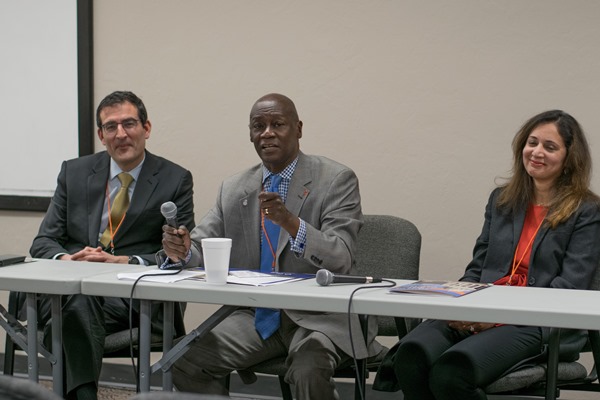
Rep. George Young (D-Oklahoma City) speaking about minority voices in local government.

Brady Henderson, Sarah Adams-Cornell, Mana Tahaie and Joseph Thai speaking on “An Intersectional Approach to Strengthening Hate Crime Law.”
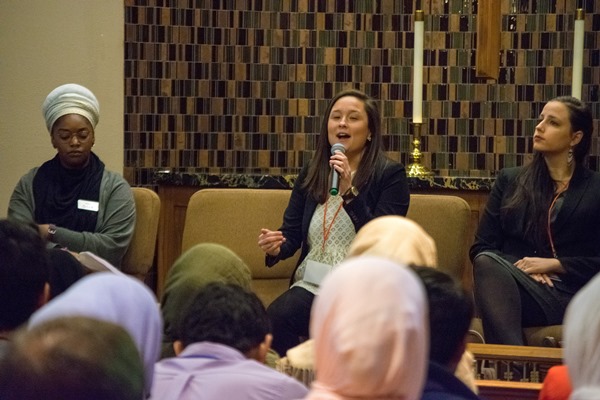
Rep. Cyndi Munson (D-Oklahoma City) speaking to a group about youth organizing, advocacy, and activism.
From Heide Brandes:
On Thursday, members of Oklahoma’s Muslim community and other supporters joined for the 2017 Oklahoma Muslim Day at the Capitol to share not only a message of civic engagement, but to face new challenges in the state and nation.
Hosted by the Oklahoma chapter of the Council on American-Islamic Relations (CAIR-OK), the day-long event featured special speakers, break-out sessions and a gathering at the State Capitol to talk with legislators.
“If there was ever a time for us to be concerned, for us to be alarmed about what is going on in the State’s Capitol as well as the Nation’s Capitol, this is it,” said Dr. Tariq Sattar, board chairman for CAIR-OK. “I have often found myself thinking of the Pledge of Allegiance that we recite so often in this country, but it seems like our elected officials have forgotten some of the words that make up the Pledge of Allegiance.”
Sattar said the nation had become divided and urged members of the group to reach out to leaders.
“For a country that values liberty and justice for all, we are quickly becoming a country where liberty and justice may very well depend on the color of your skin, the language you speak or the religion you practice,” he said. “These are unfortunate and difficult times.”
The 2017 Oklahoma Muslim Day at the Capitol opened with remarks from CAIR-OK leaders before a series of panel discussions on topics ranging from strengthening hate crime laws, youth advocacy and the future of the first amendment.
As an organization, CAIR-OK has spent more than 10 years advocating for the Oklahoma Muslim community, pushing back against anti-Muslim laws and fighting for civil rights. Adam Soltani, executive director of CAIR-OK, said this year, more than ever, Muslims and others need to band together to stop hateful legislation.
“As a Muslim community, we have been the unfortunate target of anti-Muslim legislation and hate rhetoric from our elected officials,” said Soltani.
Last October, Soltani said, an interim study was hosted by Rep. John Bennett (R-Sallisaw) about Muslims in the nation.
“It was a hate session,” Soltani said. “The worst part of it was not only did he waste our taxpayer dollars, was not only did he propagate more hatred toward the Muslim community, but at one point one of his so-called experts looked at me and looked at Dr. Imam Imad Enchassi and called us terrorists. That hurt.
“That hurt because the vast majority of our elected leaders did not speak out against that. When bigotry becomes state sanctioned and is paid for by tax dollars, we have a real problem.”
Part of the mission of the Muslim Day at the Capitol was to ensure that Muslim voices and concerns are heard at the State Capitol.
From Nyla Ali Khan:
An important challenge is to create new openings for people, including the young, to discuss public issues and become active participants. To that end, we, in America, need to revive and reinvigorate civil society institutions that could initiate groups to assemble freely and express shared interests, values, and purposes.
As this happens, citizens involved in civil society as well as government officials need to forge strategies for conflict resolution and reconstruction of society. People must learn to work together across ethnic and ideological divides and insist that everyone be included in democratic decision-making and given full access to basic social services.
In addition, everyone needs to be open to diplomacy and peaceful negotiations to further growth. The aims of that process should be repair of the frayed ethnic, racial, and religious fabric in all parts of civil society.
To that end, I talked with some religious and political figures in Oklahoma who have been actively involved with the organization of the annual Muslim Day at the Capitol. The symbolism of this day has intrigued me for a while, which is why I decided to write about the restoration of pluralism that is highlighted and underscored on this day in the seat of the state government.
The vision that the organizers, who are of diverse religious, ideological, and cultural leanings, have woven together to repair the tapestry that America once was gives me hope for the future.
“Our goal is to connect Muslims with their elected leaders and the legislative process. From the budget crisis to anti-Muslim discrimination, the actions of the legislature directly impact the Muslim community in Oklahoma in Oklahoma on a daily basis,” observed CAIR-OK Government Affairs Director Anna Facci.
Imam Imad Enchassi added that, “we bring our community year after year to meet their elected officials, and to learn about their civic duties and responsibilities. And most importantly, to engage our elected officials in a way that is productive for our city, state, and nation. Personally, I go there so that our elected officials know that we are a vital organ in this city and not ‘cancer,’ as we have been called by some elected offiials.”
Although Pastor Chris Moore, by his own admission, cannot claim to represent Christianity in its entirety, he is a very well-respected preacher in this state. After a pleasant conversation, he sent me an eloquent message about the significance of the annual Muslim Day: “This is my third time to attend the annual Muslim day at the Capitol. Each time I go I get a chance to see citizens of the state, who happen to be Muslim, learning about and engaging in their government, often for the first time. As a citizen and a pastor, I want to help enable that. Of course, I also see people who seem to think that the dream of the U.S. is only for them, and I have witnessed some awful displays because of that bitterness. I don’t want to enable that.
“I do not share the fear that many in my state and nation hold for people who practice Islam. My experience with my Muslim siblings has been a positive one, in fact a life-changing one.
“I do not attend, nor do I defend my Muslim siblings, despite my Christianity, but because of it. The Gospel I read and practice tells me to welcome the stranger, to embrace those on the margins and that the Jesus I seek always stands on the other side of whatever border I have drawn. My encounters with Muslims (and Jews and Sikhs and Buddhists and Hindus, etc.) has not weakened my faith in any way – in fact, it has made me a better Christian” Pastor Chris Moore.
I have always believed that the electoral principal is discussion, not autocratic decisions. It is essential to create either conceptual frameworks or political and sociocultural discourses in which the young people of today would be energized and persuaded to actively participate.
A politician I enjoy talking with, Sen. Connie Johnson (D-Oklahoma City), underlined that, “Muslim Day at the Oklahoma State Capitol is an event that I have supported and encouraged since its inception. It is the consummate opportunity for people of all faith backgrounds to join together in the seat of government in order to share perspectives and gaining awareness about navigating the legislative process as a method for ensuring that our policies are reflective of diversity. Every community must step up and engage policy makers in this difficult political climate. This knowledge and experience must go hand-in-hand with the act of voting, and include information on voting strategies, which ensure that every community’s votes are cast and counted.”
Rep. Scott Inman (D-Oklahoma City) echoed the message of unity and pluralism: “Events like Muslim Day at the Capitol allow us to bridge the artificial barriers created by those who seek to divide us based on race, religion, and culture. As Oklahomans, we all share common concerns about education, healthcare, and quality of life. Only by coming together in unity can we improve our state for all Oklahomans.”
I would reinforce that it is imperative that civil society actors work in collaboration with one another to focus on the rebuilding of a greatly polarized and fragmented social fabric to ensure the redress of inadequate political participation.
Today, in the politics of Oklahoma, women constitute a minority, increasing the pressures of high visibility, unease, stereotyping, inability to make substantial change, over-accommodation to the dominant male culture in order to avoid condemnation as “overly soft.” Even those with access to the echelons of power are unwilling or unable to challenge state-centered, elitist, and masculinist notions of security.
New efforts and new forums are required not just in Oklahoma but in other parts of the world as well for the germination of new ideas, broad based coalition politics that transcends organizational divides, and gives women the space and leeway to make important political decisions., which is why I conclude with Rabbi Vered Harris’s poignant message, “Deep in my collective conscience as a Jewish woman I know what it feels like to be told ‘you do not belong.’ The United States of America is supposed to be a place where people of all religions or no religion have equal access to government and can equally participate in democracy.
“I go to the Capitol to support my Muslim neighbors because it is the right thing to do as an American. I also go because as a Jewish woman I want to be a welcoming, supportive presence for people who are unjustly oppressed or threatened. Too many people wrongly think that Jews and Muslims do not get along because of the Israeli-Palestinian conflict and the way Israel is regarded by its Arab neighbors. That’s just wrong, and to be silent as a Jew would be to further the misperception.
“And finally, while this is my third year in attendance, it is my first year to go to the sessions and learn alongside the Muslim participants. When I looked at the titles of the sessions I realized they would be excellent learning for me as a Jew, too. I am looking forward to learning together and strengthening my understanding of what Muslims in Oklahoma care about. I anticipate that when it comes down to who we are as Americans, we all care about the same basic rights and how to protect and exercise them.”
I was on a panel on women’s empowerment with Rep. Jason Dunnington (D-Oklahoma City) a year ago. Today, I spoke with him about the significance of the annual Muslim Day, and his response was encouraging to say the least:
“As a State Representative in Oklahoma I protect all citizens right to democracy and religious freedom. Our state must support religious freedom for all faiths, which is why I was honored to participate at Muslim Day at the State Capitol.”

